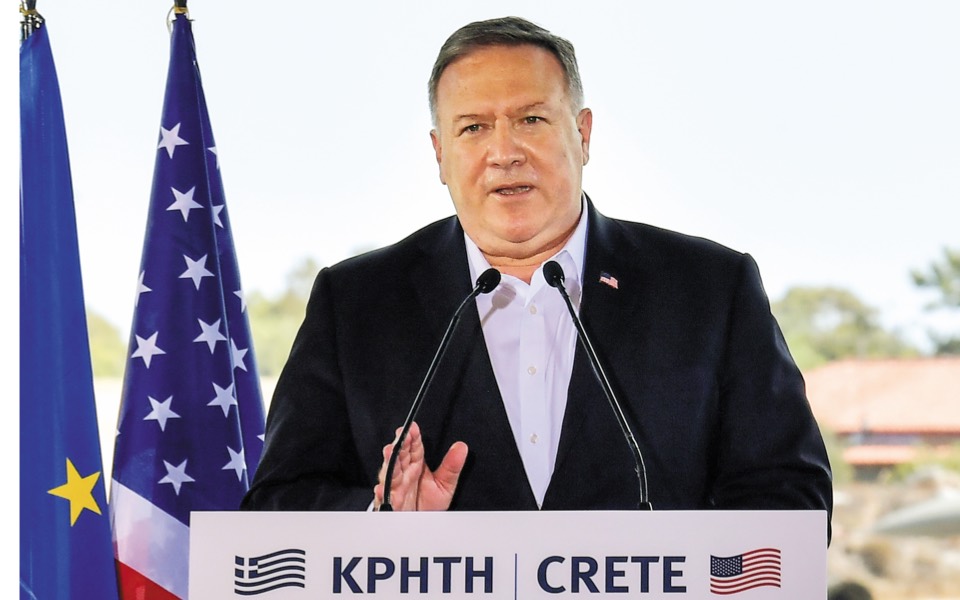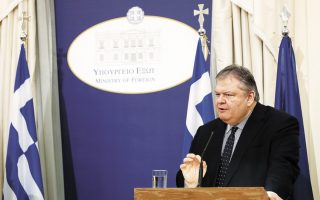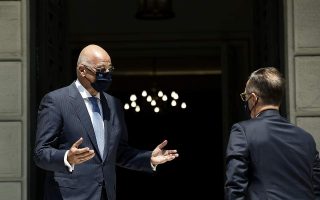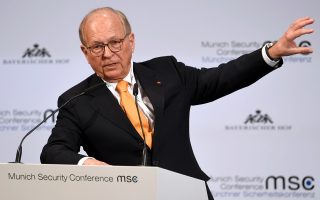Pompeo sees window of opportunity for dialogue, in Kathimerini interview

In an interview with Kathimerini, US Secretary of State Mike Pompeo deplores the use of threats and unilateral actions as a way of resolving bilateral disputes, sending a clear signal to Turkish President Recep Tayyip Erdogan.
“International law governs dispute resolution mechanisms that are appropriate; what’s not useful is when countries directly or unilaterally act in a way that causes conflict and creates the risk of escalation,” said Pompeo, who yesterday held talks with Greek Prime Minister Kyriakos Mitsotakis on Crete and visited the US naval base at Souda Bay.
Pompeo sees “a window of opportunity” for a Greek-Turkish dialogue, adding that the US administration will “play any role that’s appropriate and useful and constructive.”
Furthermore, he stresses that Washington remains strongly committed to the Eastern Mediterranean region, adding that “there’s no [US] plan to move out of Incirlik at this time.”
This is the second time you have visited Greece and you were in Cyprus just a couple of weeks ago, so I wanted to ask you: Why visit this time? Why is it important? What is the message you are bringing? Also, as it has been noted, you are not going to Turkey this time, as your predecessors did.
I’ve traveled to Turkey during my time as secretary of state as well, but it was important for me to come here. Greece is an absolute pillar of strength here in the Eastern Mediterranean and an important regional partner. I travel all over the world, but I wanted to come here, actually, to visit two different parts of the country – not Athens, but Thessaloniki and Crete. I wanted to focus on what energy opportunities there are. There is really good work being done that will benefit not only Greece but the Balkans and even up into Central Europe. There could be a real opportunity there for American businesses. I wanted to come to understand that better.
I came here to see the American forces, to talk to them and thank them for their service, and also to be present in the region. It’s very important when there are maritime conflicts, when there are disputes about international rights and international waterways, that they be resolved peacefully. It’s very important and also the message I have brought to the Greek leadership is the message we have passed on to the leadership in Turkey as well.
Were you and President Donald Trump very concerned about the possibility of a confrontation between Greece and Turkey in the last few months?
We always watch when there are heightened tensions where there are disputes taking place. President Trump, I know, has spoken to both Prime Minister Mitsotakis as well as to President Erdogan and he conveyed a similar message, which is: International law governs dispute resolution mechanisms that are appropriate; what’s not useful is when countries directly or unilaterally act in a way that causes conflict and creates the risk of escalation. It’s not the right way to go about solving these problems and we’ve urged all the parties to resolve these matters between themselves, through the international norms of diplomacy.
There seems to be a window right now for mediation and dialogue. Are you optimistic? Is the US going to play the leading role or are you going to leave Germany in the driver’s seat?
We have the European Council meeting this week, so let’s see what comes out of that. I do think you’re right, there is a window of opportunity here and I think President Trump has said we’ll play any role that’s appropriate and useful and constructive. I think we’re leaning in the right direction. We have a simple set of objectives; we want this to be resolved in a way that reflects how, behind these conflicts, behind these disagreements that haven’t been resolved for an awfully long time, there are diplomatic means to enforce international law in a way that’s appropriate and while recognizing the rights of every sovereign nation.
Turkey has been asking for the demilitarization of the Greek islands in the Aegean and there were some reports that the US supported that. Is that the case or not?
We have taken the position that these various demands, these various conflicts, various claims, need to be resolved through a normal international process, that it’s the right way to resolve them. The disputes that you see here in the Eastern Mediterranean, there are handfuls of these all across the world. We have always said that in cases like the South China Sea, we should revert to international norms and international law and we should not act in ways that are threatening, with the threat of military conflict, but that they should be resolved through the mechanisms that are available to every country.
Let me just insist on this point because a lot of people in Greece are wondering whether, if diplomacy fails again and Turkey starts unilateral actions in the Med, the US intervene would in a more proactive way?
I don’t want to get into hypotheticals. We are driving towards the single objective of resolving this in a way that is consistent with international law, diplomatically. It’s why the secretary of state was sent here.
There has been some criticism from Congress and the Greek-American lobby about the fact that you have sanctions on your desk in response to Turkey’s purchase of the Russian S-400 missile defense system but they have not been signed and moved forward. What’s the case with those?
The United States government has made clear that we don’t want the Turks to operationalize their S-400. We’ve been working with them through diplomatic channels to try to find a solution to this. We also took significant action. We removed the F-35 program from Turkey as a result of the action they took. We’ve responded, we are addressing it and we are handling it in the way that I’ve been speaking about, which is through diplomacy, through conversation, through discussion. We hope that this will lead to an outcome. I mean it is consistent with what we hope for every NATO nation, we want them to buy systems that are interoperable so that NATO can be effective in performing its regional mission.
We all see that the defense cooperation between Greece and the US is widening. What prospects do you see for it? Do you see any point where there could be an explicit US security guarantee towards Greece in case it is attacked by another country?
Well, we have NATO sitting there, with all the NATO obligations and commitments that have been around for an awfully long time. To your point, it is the case that US-Greek military cooperation continues to improve, not only with the things you saw today like the announcement we’re going to homeport a ship here in Crete, or only the tactical things we have done alongside of each other, but lots of things that aren’t as obvious, such as training efforts, work on strategy. All the things that militaries can work on together, we are doing, and I think it makes each of our two militaries stronger, better, more capable, more interoperable, and more likely to accomplish our mission should we be called upon to do so.
There have also been a lot of reports in the European press about the possibility of the Incirlik base being moved to Greece. Is there any truth in that or is it completely out of the question?
There’s no plan to move out of Incirlik at this time.
There was a sense at some point that the US was withdrawing from the Eastern Med. Is your presence here and what you’re doing here proof that this is not happening?
Yeah, I think that’s the case. The United States has important interests here, we have a responsibility to NATO as well, and we also have come to see that what happens to the Eastern Mediterranean also has an enormous impact on security and stability not only in Southern Europe but in the Middle East as well. We want to make sure that we do all the right things to deliver peace and security in this region, so I think it’s the case that our commitment to the Eastern Mediterranean continues to improve.
The Turkish survey ships have withdrawn from areas of Greek interest but they are still around Cyprus. Do you have a position on that?
Yes, we think that international law should govern all waterways, and when there are disputes, a nation ought not take unilateral action to try to gain an advantage; one ought to resort to international norms in order to enforce claims that one believes that one rightfully holds.
Is there one moment from this trip that has really stuck in your mind?
Goodness, there are so many. I had the glorious chance to go visit the Jewish Museum in Thessaloniki – it’s important that we remember history and that wherever we find anti-Semitism we have an obligation to respond to it. It was also great to be with the members of the United States Navy today, to see young people do great work alongside an important partner here in Greece, and then we had great meetings with the Greek leadership, as well. I always enjoy the time I get to spend with them.





